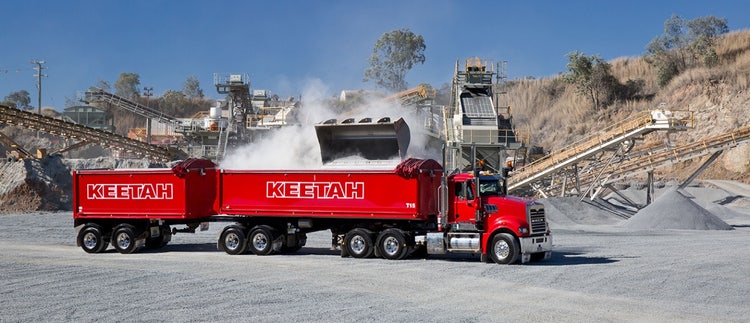
“There’s nothing out there that makes me want to look anywhere else.”
Simon and Nick Humble’s fleet of 25 Macks are a key component of the local economy in Gladstone. Simon tells us why he uses only Macks to keep his business moving.
Since taking over a local Gladstone transport company in 2002, Simon and Nick Humble have built a fleet of 25 Macks that services a small but select group of blue-chip companies in the region, including Rio Tinto and Cement Australia.

Super-Liners, Tridents and Metro-Liners
“We have a couple of Super-Liners carting road trains full of grain, but the bulk of the fleet are our Tridents,” says Simon. “They do local short-haul work, five-to-12 trips a day around Gladstone, delivering road-base, sand, drainage, sometimes rock.”
The fleet also includes ten Metro-Liners that work on-site at customer locations.
“The Metro-Liners typically never get above about 20 km/h,” says Simon, “but they’ll do 100 tips in twelve hours.”
Set up under PBS for a specific job
The Tridents are all set up as 19-metre B-Doubles or truck and 4-axle dog combinations under a Performance Based Standard (PBS) that enables them to carry 57.5 tonnes instead of the usual 51 tonnes.
“The PBS scheme is fantastic,” says Simon, “it’s made a huge difference. Of course, we have to fit all the latest safety gear, increased-strength cabs, low-emission engines and so on, but it’s all well worth it for that extra payload.”
And m DRIVE wins them over again
The two Super-Liners and the latest Trident are fitted with the m DRIVE automated manual transmission, which has been very well received by 90% of the drivers.
“There’s a couple of old-school drivers who maintain they prefer a manual,” says Simon, “but I reckon if I actually put them back in one I’d get a different story. Most of the drivers won’t go back to manuals, and all the new Macks I order will have m DRIVE.”
Keeping them rolling through
The company turn their trucks over every four to five years, but Simon’s happy to run them longer if necessary, because he knows the Macks can cope.
“That’s another reason for going with Mack, I’m quite confident the product will last. We work them pretty hard, but they handle it.”
A long association
Simon originally trained as a mechanic and learnt his trade in a Mack workshop, before going into agronomy, so he’s been associated with Mack for a long time. When it came to expanding the fleet he didn’t have to look far.
“I got in touch with some of my friends from my apprenticeship days,” he says, “some of them still work for Mack, and they gave me a few pointers. There’s a lot to be said for Mack, their parts are always readily available and the m DRIVE and MP8 and MP10 engines are very fuel-efficient and reliable. There’s nothing out there that makes me think I should be looking anywhere else.”

